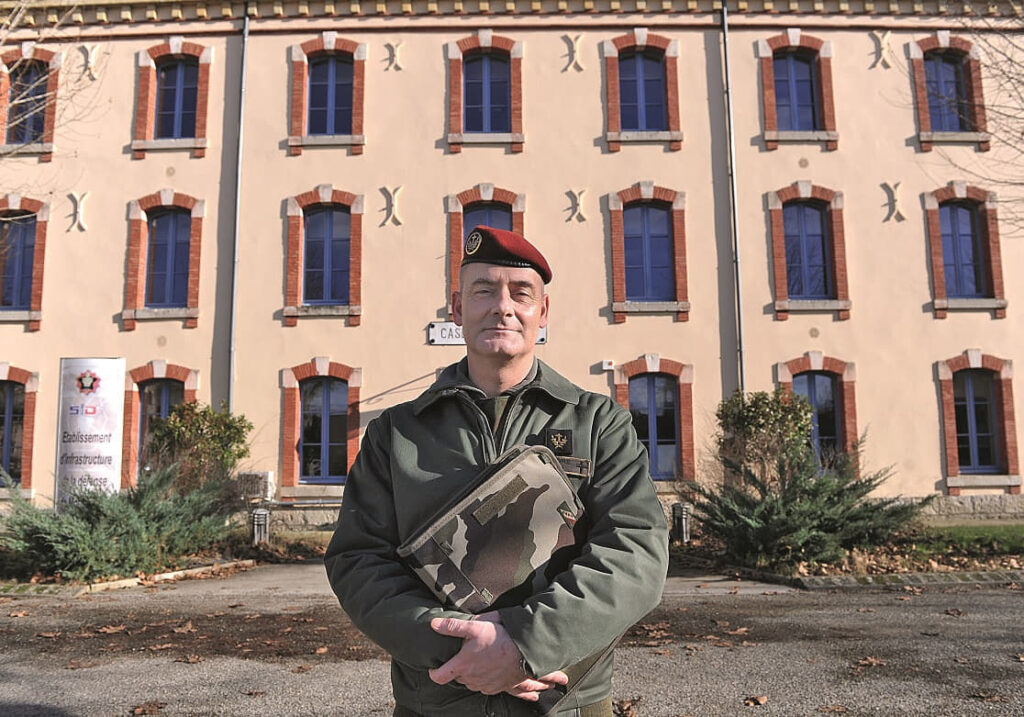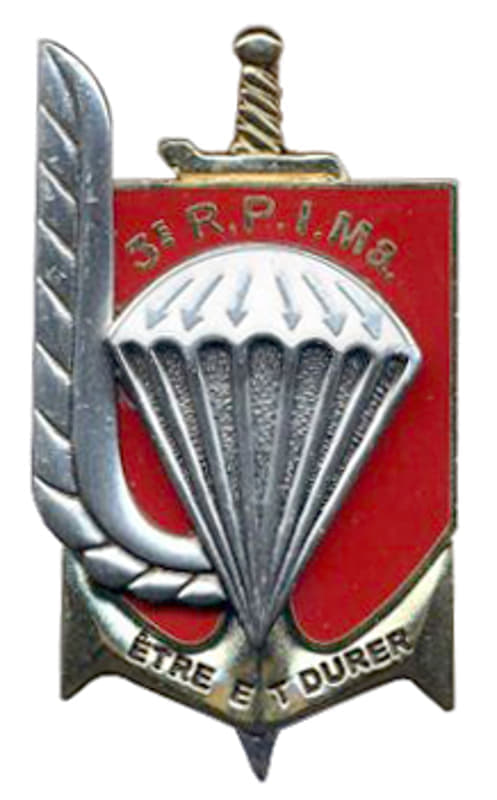Padre Christian Venard studied history and law in Paris, before going to study philosophy and theology in Rome. He became a priest in 1997, and he has been a military chaplain in the French army for 22 years, mainly with the paratroopers. He participated in 16 overseas operations in all the theaters where France was engaged (from Kosovo to Mali, through Afghanistan, etc.). Since September 2020, he has been chaplain of the Monaco Public Force (Carabinieri and Firemen) and episcopal delegate for the Communication and Digital Evangelization Department of the Diocese of Monaco.
He is the author of Un prêtre à la guerre: Le témoignage d’un aumônier parachutiste (A Priest in War: The Testimony of a Paratrooper Chaplain), and La sainteté de A à Z: Dopez votre vie spirituelle! (Holiness from A to Z: Boost Your Spiritual Life).
We are so very honored to have this conversation with him.

The Postil (TP): Please tell us a little about yourself. What led you into the vocation of an army chaplain?
Padre Christian Venard (PCV): I come from a military family, going back several generations. So, when the question of a vocation to the priesthood came up for me, it was quite obvious to me that I wanted to serve Christ and His Church in a military setting.
TP: Is military priesthood different from being a pastor in a parish?
PCV: Yes and no. No, in the sense that one is a priest exactly like any other priest with the same obligations of life and prayer and that one exercises one’s ministry within the particular framework of the diocese of the armed forces.

Yes, because the lifestyle of the military chaplain is similar to that of the “worker priests” in the 1950s and 1960s. The chaplain is immersed in military life, while remaining fully a priest; he adopts the customs and habits, the uniform, the way of life, the training, the departure on operations. His objective: to be as close as possible to everyone—always available, open and welcoming to all. Finally, this ministry allows the priest to be in contact with a whole population that is largely outside the churches: mostly men between 20 and 40 years old!
TP: Are men in the army more religious than civilians? Or, is secularism more predominant than faith?
PCV: The French army is the image of the civil society from which it comes, and this is rather reassuring. The men and women who work in the army are mostly indifferent to religion, and practice a kind of practical state atheism, taught by the French national education system. That being said, the specificities of the military, the official presence of the four recognized religious denominations (Catholic, Protestant, Jewish and Muslim) and certain sociological particularities (in particular the rate of Catholic religious practice among Saint-Cyrien officers, or the tradition of the feasts of arms) mean that religion is more present within the armed forces than in the rest of society.
TP: What are some of the challenges that you faced as a chaplain?
PCV: The first one is to be accepted in such a particular environment. Certainly, because of my family history, several elements predisposed me to it. However, as for every chaplain, you have to “prove yourself” in some way. One cannot impose oneself only with one’s title of clergyman. It is necessary to show that you have the human qualities that can make you a “member of the clan.” This was particularly true of paratroopers. You had to go through the parachute certification and regularly go jumping out of planes with the guys.
A second challenge will probably surprise you. That of standing up to the hierarchy of military chaplaincy. I have known four bishops in the armed forces, appointed by the Vatican, who knew little about the specific vocation of military chaplaincy. The last three surrounded themselves with advisors who would blinker them in this respect. This put me (and other chaplains) in very distressing situations, and led to misunderstanding, even persecution, because of this hierarchy not wanting to accept the particularities of military life.
TP: What was the most humorous experience that you had as a chaplain?
PCV: One day, with a fellow parachute chaplain, we were with our young people who were learning to jump and were in the plane for their first jump. The two “padres” were each at a door and my confrere said to me in a loud voice, just before the jump: “And you, Christian, what do you think about organ donation?” Imagine the faces of the poor young soldiers, who were already having a hard time. But we were laughing our heads off!
TP: What advice would you give to young people about service in the military?
PCV: Give it your all. Don’t look back. Never compromise yourself. Follow your ideal at the risk of your career. May the young man that I was, be able to look at the old man that he has become one day and not be ashamed of anything. “To be and to endure” (motto of the 3rd RPIMa, my beloved Regiment).
TP: Turning to larger contemporary issues—as the West becomes further de-Christianized, how should the individual Christian, who feels isolated, even “under siege,” respond?
PCV: You know the famous answer of Mother Teresa when asked what needs to change in the Church and she answered: “you and me.” There is no better way to put it. Indeed, Catholics must realize that this old European continent that they have forged through their religion over the centuries is almost no longer fed, in the public sphere, by the values of Christianity. For those who are called upon to exercise important responsibilities (in the public or private sector, it doesn’t matter), it is advisable, in its rightful place, to make the Christian faith shine, through behavior, in decisions, in philosophical choices. For all of us, it is important to bear humble witness in our daily lives, in the strongest possible fidelity to Christ and His commandments.
TP: The Church has called for the re-evangelization of Europe. Despite difficulties, are you seeing any signs of success?
PCV: Is it a distorting mirror? As the person in charge of communication in the diocese of Monaco, I can see that many Catholic initiatives are taken on social networks and with a certain success. This is a hope. Moreover, if, for the moment, the dominant culture remains rather hostile to Christianity, it seems to me to perceive in the younger generations a thirst for transcendence, for meaning, which reopens doors for evangelization. But nothing can be done today, as we well know, by arguments of authority. Only credible witness counts. In this respect, the terrible crisis of pedophilia, the equally serious crisis of authority within the Church, are so many deleterious counter-witnesses.
TP: In the modern world, we have very few heroes; we are overwhelmed by celebrities. Should we see saints as heroes?
PCV: Yes, the heroes (heralds!) of the Gospel. Men and women, whose holiness has been officially recognized, have been, according to the well-known image, illustrations in time and space, of the evangelical virtues. Virtue is both strength and struggle. One does not become virtuous by crossing one’s arms, but by boldly advancing on the path of life, always strewn with pitfalls and temptations.
TP: Who is your hero?
PCV: Many saints inspire me. Charles de Foucault is one of those who touches me the most. The vigor with which he followed the road of sin first, then that of sanctity, pleases me. There is nothing bland about this man. An immense appetite for the absolute. A confounding humility when he discovered the true meaning of his life. A form of activism almost naive in his will to create a “religious order.” Yes, all this speaks to me deeply.
TP: Holiness in our daily lives has certainly weakened, and we seem content with the ever-expanding struggle for “rights.” How can individuals cultivate and advance in holiness, given all the “noise” of the world?
PCV: To find silence, solitude (inhabited by the Spirit). Leave time for God and our soul. To extract ourselves from the tumult. It is virtuous. It is a daily struggle. Accepting the Cross of Christ, in humility and perseverance. To appear to be nothing in the eyes of the powerful—even in the Church—and to rejoice! To dare to be fraternal with those we meet—that is to say, to fully accept the inevitable wounds that will result from this, as rivers of charity for this world.
TP: Many people struggle with faith, and some have even lost it entirely. What do you say to people who cannot believe in God, let alone in Christ?
PCV: This is the question that has been asked by so many men and women after the Shoah. We cannot miss the atheist questioning. I do not know a priori what to say. I know that we must stand by, suffer with those who suffer, weep with those who weep, rejoice with those who rejoice. To witness that being a son of God is to love one’s neighbor as oneself and God above all else, at the risk of losing oneself, the better to fall into the arms of Love. Our free and respectful response to the atheist is our life. Life is a risk. Witnessing to God is a risk, if we take Him seriously.
TP: Padre Venard, thank you so very much for sharing with us your valuable experiences and ideas, and giving us your deep guidance.
